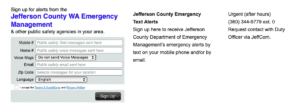Are You Storm Season Ready?
Fall season on the Peninsula in a nutshell: A bit less tourist traffic; pumpkin spice everything, everywhere; and the return of good old fashioned Pacific Northwest wind storms. So, let’s grab a spiced latte and take a look at how you can be prepared for potential outages.

 An emergency kit assembled well in the advance of a strong storm or earthquake event can be as simple as your camping/backpacking equipment in a storage container with some notable additions (cell phone, emergency phone list, battery powered or crank radio, etc). You should not be planning when dangerous weather is in your area or after an earthquake strikes. Stores may not have the supplies in stock you will need to ride out several days without power.
An emergency kit assembled well in the advance of a strong storm or earthquake event can be as simple as your camping/backpacking equipment in a storage container with some notable additions (cell phone, emergency phone list, battery powered or crank radio, etc). You should not be planning when dangerous weather is in your area or after an earthquake strikes. Stores may not have the supplies in stock you will need to ride out several days without power.
What does a home safety kit look like?
Perhaps one of the best overall guides for our region is the Think, Plan, Do (Repeat) booklet from the Jefferson County Emergency Management. Well worth the download/print/read!
- Non-Food Items: Flashlight(s), batteries, blankets, warm clothing, emergency phone numbers, battery-powered radio, a first aid kit and other items you might need if power is out for several days.
- Food Items: Stock up on dried goods. Rice, pasta, beans, grains, nuts, seeds, dried fruits, and vegetables, dried soups/noodles, trail mixes are all great to have on hand, plus non-perishable entrees. Non-perishable refers to canned fruits, vegetables, meats, beans, soups, and sauces. Also consider adding some shelf-stable foods to the menu: Peanut butter, jelly, honey, syrup, canned milk, powdered milk, and coffee (pumpkin spice optional).
- Water: Remember: No power, no water. Bottled water is a must. Plan for 3 gallons of water per person, per day. Change out stored water each year for safe keeping.
- Medications: Attempt to have all needed medications on-hand.
- Cooking: If you use a camp or propane stove, DO NOT USE IT INDOORS. Carbon monoxide deaths are very common during prolonged outages.
- Fuel: Prior to a storm, make sure your vehicle has plenty of gas. When power is out, gas pumps at service stations typically don’t work. Always consider you vehicle as part of your safety kit, should you need to relocate in a hurry.
- Phone & Charging: When a major storm is anticipated, keep your cell on the charger as long as possible. You may need it if the land lines go down. A simple mobile battery backup (like this) can add much needed life to your cell phone during extended outages. They’re also great for camping! Just ensure they are always charged and ready for use.
Where do I get storm information and updates from emergency services?
- National Weather Service (Seattle) as your source for weather information. Pay particular attention to Watches, Warnings and Advisories as they will offer information regarding timing, strength and duration of winds.

- Jefferson County Emergency Management NIXLE text alerts. Free text service providing timely information for local and regional outages, fires, accidents and road closures, and response efforts. Signing up is simple! You can also sign up by texting: JEFFCODEM to 888777 on your cell phone to enroll in the free message service.
- Jefferson PUD website & social media channels. Outage updates will be posted to the PUD’s main page and outage page. Follow our social channels (Facebook and Nextdoor) for the latest.
What else should I consider if there is longer outage?
- Garage door: No power can make garage doors tricky. Locate the manual release lever and know how to operate it. Take you time, and have an assistant help lift an unlocked garage door to avoid injury.
- Keep food cool: Only open your freezer when absolutely necessary. Use freeze-pack inserts and keep them frozen. Use a cooler. Freeze water in plastic jugs or containers or store bags of ice.
- Surge protectors and/or battery systems: Computers and TV’s are touchy. Surge protectors can minimize hard to sensitive electronics during an unplanned outage.
- Generator: If a permanent generator installation is desired, consult a licensed electrician to install an approved transfer switch. DO NOT connect a generator directly into your home’s main fuse box or circuit panel. View our Generator Safety Page for more info. Educate yourself on generator safety and how to prevent carbon monoxide poisoning.
